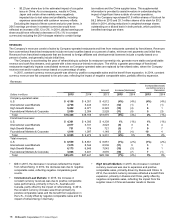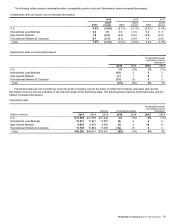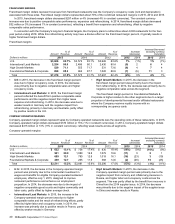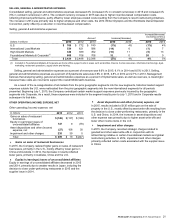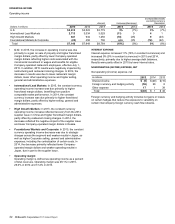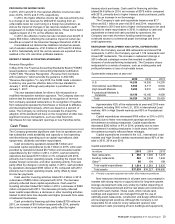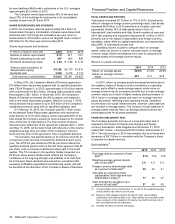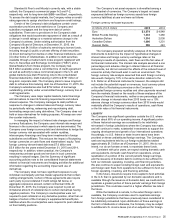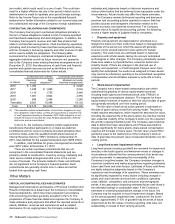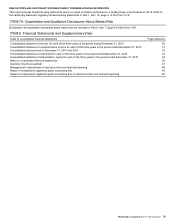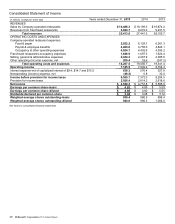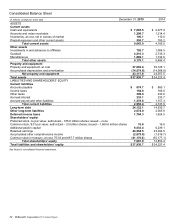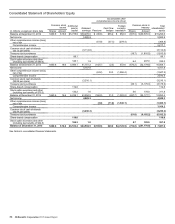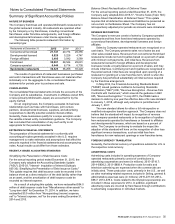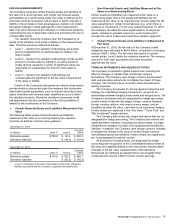McDonalds 2015 Annual Report Download - page 29
Download and view the complete annual report
Please find page 29 of the 2015 McDonalds annual report below. You can navigate through the pages in the report by either clicking on the pages listed below, or by using the keyword search tool below to find specific information within the annual report.
McDonald's Corporation 2015 Annual Report 27
Litigation accruals
In the ordinary course of business, the Company is subject to
proceedings, lawsuits and other claims primarily related to
competitors, customers, employees, franchisees, government
agencies, intellectual property, shareholders and suppliers. The
Company is required to assess the likelihood of any adverse
judgments or outcomes to these matters as well as potential
ranges of probable losses. A determination of the amount of
accrual required, if any, for these contingencies is made after
careful analysis of each matter. The required accrual may change
in the future due to new developments in each matter or changes
in approach such as a change in settlement strategy in dealing
with these matters. The Company does not believe that any such
matter currently being reviewed will have a material adverse effect
on its financial condition or results of operations.
Income taxes
The Company records a valuation allowance to reduce its deferred
tax assets if it is more likely than not that some portion or all of the
deferred assets will not be realized. While the Company has
considered future taxable income and ongoing prudent and
feasible tax strategies, including the sale of appreciated assets, in
assessing the need for the valuation allowance, if these estimates
and assumptions change in the future, the Company may be
required to adjust its valuation allowance. This could result in a
charge to, or an increase in, income in the period such
determination is made.
The Company operates within multiple taxing jurisdictions and
is subject to audit in these jurisdictions. The Company records
accruals for the estimated outcomes of these audits, and the
accruals may change in the future due to new developments in
each matter.
In 2015, the Company decreased the balance of
unrecognized tax benefits related to settlements with taxing
authorities by $258 million. In 2014, the Company increased the
balance of unrecognized tax benefits related to tax positions taken
in prior years by $505 million, most of which came from foreign-
related tax matters. After considering the impact of deferred tax
offsets, interest and penalties, these foreign-related tax matters
negatively impacted the effective tax rate by 4.1%. See the
Income Taxes footnote in the Consolidated Financial Statements
for the related tax reconciliations. The most significant new
developments in 2014 and 2015 are described below.
In 2014, the Company received an unfavorable lower tax
court ruling in a foreign tax jurisdiction related to exempt income
matters. As a result of this new information, the Company changed
its judgment on the sustainability of this tax position for 2003-2010
and recorded an increase in the gross unrecognized tax benefits
of $188 million. In 2015, the Company received an unfavorable
decision related to its procedural efforts to appeal the 2014
unfavorable lower tax court ruling. As a result of this new
information, the Company agreed to settle the issue for 2003-2008
with the tax authorities and the unrecognized tax benefits were
reduced by $143 million. No cash payment was made related to
this settlement in 2015 as the Company had previously made a
payment to the taxing authority. The settlement did not have a
material impact on the Company's cash flows, results of
operations or financial position.
In 2014, the Internal Revenue Service (“IRS”) concluded its
field examination of the Company’s U.S. Federal income tax
returns for 2009 and 2010. In connection with this examination,
the Company agreed to certain adjustments proposed by the IRS.
The liabilities previously recorded related to these adjustments
were adequate. In early 2015, the IRS issued a Revenue Agent
Report for these agreed adjustments and the balance of
unrecognized tax benefits was reduced by $102 million.
Also in 2014 in connection with the IRS examination of
2009-2010, the Company received notices of proposed
adjustments related to certain transfer pricing matters and
engaged in audit defense discussions with the IRS. As a result of
this new information in 2014, the Company changed its judgment
on the measurement of the related unrecognized tax benefits and
recorded an increase in the gross unrecognized tax benefits of
$38 million. The Company disagrees with these proposed
adjustments and filed a protest with the IRS Appeals Office in
2015. The Company expects resolution on these issues in either
2016 or 2017.
In 2014, the Company received new information from tax
authorities during the progression of tax audits in multiple foreign
tax jurisdictions, including the receipt of proposed tax
assessments primarily related to transfer pricing matters. As a
result of this new information, the Company changed its judgment
on the measurement of the related unrecognized tax benefits and
recorded an increase in the gross unrecognized tax benefits of
$207 million. The Company settled certain of these tax audits in
2014 and plans to defend its position with the tax authorities on
the remaining audits. In 2015, there was no significant progression
on these audits.
In December 2015, the European Commission opened a
formal investigation directly with the Luxembourg government to
examine whether decisions by the tax authorities in Luxembourg
with regard to the corporate income tax paid by certain of our
subsidiaries comply with European Union rules on state aid. If this
matter is adversely resolved, Luxembourg may be required to
assess, and the Company may be required to pay, additional
amounts with respect to current and prior periods and our taxes in
the future could increase.
While the Company cannot predict the ultimate resolution of
the aforementioned tax matters, we believe that the liabilities
recorded are appropriate and adequate as determined in
accordance with Topic 740 - Income Taxes of the Accounting
Standards Codification (“ASC”).
Deferred U.S. income taxes have not been recorded for
temporary differences totaling $14.9 billion related to investments
in certain foreign subsidiaries and corporate affiliates. The
temporary differences consist primarily of undistributed earnings
that are considered permanently invested in operations outside
the U.S. If management's intentions change in the future, deferred
taxes may need to be provided.
EFFECTS OF CHANGING PRICES—INFLATION
The Company has demonstrated an ability to manage inflationary
cost increases effectively. This ability is because of rapid inventory
turnover, the ability to adjust menu prices, cost controls and
substantial property holdings, many of which are at fixed costs and
partly financed by debt made less expensive by inflation.



